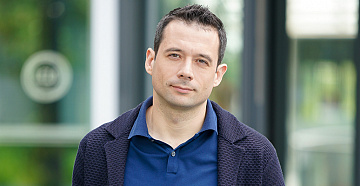«Transformation is a natural reaction to external changes»
The main task of STEP LOGIC today is to change customer communication channels as seamlessly as possible and set up flexible cooperation within working teams. Remote and distributed work requires a higher degree of autonomy, therefore active implementation of decision-making data-driven techniques is ongoing. We are talking about this with Roman Ostapchuk, Deputy CEO for Technical Development at STEP LOGIC.
– Roman, what most relevant internal changes companies are introducing in your sector today?
– Almost all projects for implementation of IT technologies are complex chains of interactions between different organisations. Earlier operational processes actively used direct communication between individuals. Current situation forces us to reinvent communication and tie it to areas, such as coordination and work execution, forecasting and planning, training.
At the same time, pandemic provided necessary impulse for introduction of best practices that do not require physical participation. Current restrictions allow for more active replication of these practices.
– What changes did the pandemic force you to introduce to the internal development plans?
– We had to make significant adjustments to our work processes due to the pandemic. The company has accelerated the realisation of internal process automation autonomous decision-making objective data-driven projects.
Transition to a remote working had a serious impact on the personnel working, training processes and technology portfolio development.
Technical support, new complex solutions sales and high-quality project implementation are impossible without coordinated and efficient cooperation between multiple employees. To support such teams, we have created an omnichannel IT platform that integrates all input and output data flows and working tools, including WFS, BMP, mail, phone and Instant Messaging.
– What else is driving transformation in IT companies today?
– IT companies are forced to adapt to serious external changes, such as increased competition, diversification of economic sectors, a serious trend towards import substitution, staff shortages. It forces market players to search and test new ideas, modify existing practices and sometimes reinvent old methods, deliberately put aside earlier.
– What innovations and transformations are now necessary for maintaining competitiveness and why? Is it at all possible to stay competitive without transformation?
– Transformation is a natural reaction to external changes. If a company has created a unique business model and occupied a unique market niche, it can remain competitive for a fairly long period of time, regardless of the external changes. However, the overwhelming majority of IT companies are integrated into the economy and society exchange processes which requires continuous adaptation.
Difficult economic situation is the key pressure factor in IT sector at the moment. In my opinion, staff shortage is also a massive problem. According to research, by 2024 the deficit of high quality IT experts will reach 300 thousand specialists a year.
These issues make accurate planning, feasibility studies, risk management, as well as effective and flexible personnel management the most important factors in IT industry.
– Is there anything that can be called a "fashion" or image trend?
– I hope that in these trying times the most “fashionable” trend for IT companies will be comprehensive social support for employees, assistance in adapting to current working conditions and training. STEP LOGIC strives to adopt the best industry practices and tries to create a comfortable working environment for its employees and customers.
– What changes are being introduced within your company?
– Our main goal for today is to change customer communication channels as seamlessly as possible and set up flexible cooperation within working teams.
Remote and distributed work requires a higher degree of autonomy, therefore active implementation of decision-making data-driven techniques is ongoing.
– Tell us more about any of your internal projects.
– Remote collaboration does not allow relying on local and personal information exchange anymore. We are refining the existing IT tools to facilitate prompt, convenient, confidential and secure critical data collection. The next step is to increase the share of autonomously made tasks and decisions.
The key internal project for this period is to reinvent data collection, analysis, decision making and information systems that automate them, which will allow us to maintain the existing SLA levels.
– Will your company change its positioning due to these projects, and if so, how?
– In my opinion, the main purpose of system integration is to centralise various practical experience and transfer it to other organisations. We are planning to complement the existing STEP LOGIC positioning as a universal IT integrator with industry-specific expertise and innovative solutions for specific industries.
– What is your forecast regarding further transformations in IT sector on the domestic system integration market. What has to be transformed in the nearest future and why? What goals must be achieved?
– Today, system integrators are leading the development of promising solutions more and more often. They develop optimal IT tools for effective investment both in the development of new expertise and in operational excellence for existing businesses. System integration greatly contribute to the development of technology. Its importance will not be diminished even in the face of an increasing number of manufacturers and the qualitative growth of expertise of end customers.
– Thank you for the interview!
Source: ict-online.ru
